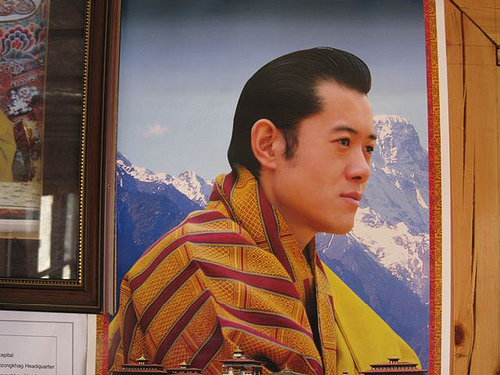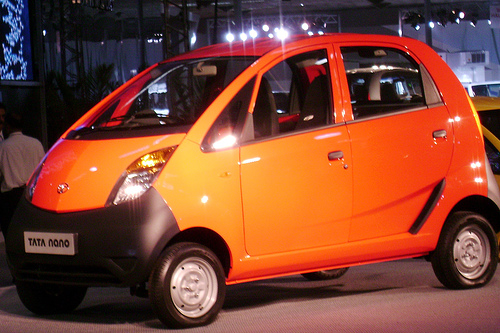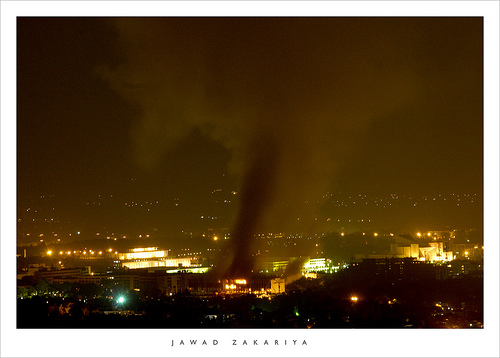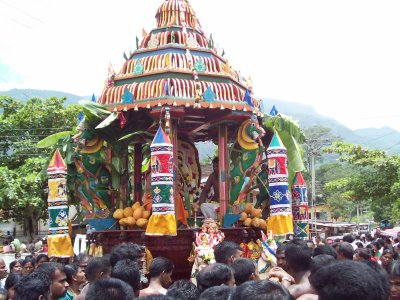Looking back on the events that rocked South Asia in the year 2008 we see that terrorism took the center stage in many places in this region. This was also a year of crucial and decisive elections in many South Asian countries.
The Global Voices coverages of the blogospheres of this region highlighted important perspectives on various news that dominated the international press. They also brought up those issues which were less highlighted by the press. We will look at some of the most important issues or news makers of 2008 in the eyes of the Global Voices authors and the bloggers of the region.
Bangladesh:
Bangladesh was effected with the world food price hike and subsequent shortage of rice. Bloggers debated [1] whether Bangladeshis were facing a hidden hunger as a consequence.
The freedom of press was much questioned in Bangladesh. Bangladeshi bloggers had heated discussions [2] on media repressions in the country.
 [3]
[3]
A collage of photos (click on the image for full display), which were displayed in the Sidr Aid Photography Exhibition 2008. By: Russell John [4]
The use of citizen media flourished in Bangladesh in 2008. A moderate earthquake jolted Dhaka city on the 27th of July and almost instantaneously citizen journalists from Dhaka started to report on this [5] via tweeter and blogs.
Some Bangla bloggers demanded justice for a poor worker, who was abused and killed and justice was delayed for her as evidences went missing and the case was stopped. Something unprecedented was seen [6]:
An online campaign was launched, which included blog [7] , Facebook group [8], an i-petition [9] etc. Offline, there were protests and human chains organised to raise the public's awareness of the case.
These prompted the mainstream media to bring this issue alive. The case was finally re-started.
An AFP story [10] claimed that a wealthy Bangladeshi has constructed ‘an exact copy’ of Agra's legendary Taj Mahal spending 58 million dollars which was relayed by many international media across the world. Some Bangladeshi bloggers went there to investigate and reported via [11] blog posts, pictures and videos that the claims were far from truth and it is probably a money making scam.
The long awaited parliamentary election of Bangladesh will take place on December 29, 2008. Global Voices will highlight the citizen journalists’ efforts [12] during the election.
Bhutan:
In Bhutan tourism is discouraged [13] to protect the culture. However some bloggers hoped [14] that a “Miss Bhutan” Competition would set a new trend breaking the ice.
A visitor blogger claimed [15]:
“The whole country is a photographer’s paradise. The dzongs and monasteries are all beautiful. But so are the people. So calm and friendly.”
Bhutan has now entered a new era of democracy after the elctions in December 2007 and March 2008. On several occasions Global Voices has linked to Tshering Tobgay [16], a Member of Parliament of Bhutan and the leader of the opposition party, who is blogging on different issues.

His Majesty, Jigme Khesar Namgyel Wangchuck: Image by grassvalleybrent [17], used under a Creative Commons License [18]
The coronation [19] of the new Bhutanese King His Majesty Jigme Khesar Namgyel Wangchuck was held in November. Some Bhutanese netizens used blog [20] to pay tribute to the king. However, a debate also sparked [21] as the Nepali refugees were ignored in the King's coronation speech.
India:
On the happier side, India unveiled the super mini $2500 car Tata Nano and the blogosphere [22] were buzzing with pride and commented that cars should no longer be luxury goods. Much to the bloggers delight [23]the Tata Motors of India later acquired Jaguar and Land Rover from Ford Motors.

Tata Nano by Flickr user Incrediblesyurveda [24] used under a creative commons license [25].
The India-US nuclear deal was also a much debated [26] but positive development [27] for India.
But the year 2008 was particularly a bad year for India. On 13th May, serial blasts rocked Jaipur [28] and 60 persons were killed. In July, India was rattled and bled by more bomb attacks in Ahmedabad [29] & Bangalore [30] with barely a gap of 24 hours. The bloggers sounded their frustration on the government's failure to address lapses of security.
On September 13th Delhi was rocked and terrorized by serial blasts [31]. A month later India's northeastern state of Assam was rocked [32] by a series of bomb blasts which killed at least 76 people and injured hundreds. Some bloggers asked whether bomb blasts are becoming normal affair for Indians and wondered which city would be next.
 Their prediction came true as on November 26th, 10 terrorists landed in Mumbai via boat and large-scale terror attacks using a combination of gun fire, blasts, grenade blasts were started simultaneously in various locations. Global Voices was breaking the news thanks to Neha Viswanathan, former editor and regular contributor for GV, who started updating from the citizen media channels like blog, tweeter, Flickr, etc. in the early hours of the tragedy when everybody was searching for news. A special coverage page [33] was soon up. Global Voices also highlighted voices from other countries of South Asia and Middle East who opined on this tragic event.
Their prediction came true as on November 26th, 10 terrorists landed in Mumbai via boat and large-scale terror attacks using a combination of gun fire, blasts, grenade blasts were started simultaneously in various locations. Global Voices was breaking the news thanks to Neha Viswanathan, former editor and regular contributor for GV, who started updating from the citizen media channels like blog, tweeter, Flickr, etc. in the early hours of the tragedy when everybody was searching for news. A special coverage page [33] was soon up. Global Voices also highlighted voices from other countries of South Asia and Middle East who opined on this tragic event.

CNN displaying the home page of Global Voices while reporting on Mumbai terror attacks. Image taken by medea_material [34] from Columbia and used under creative commons license.
In this year radical Hindu nationalist mobs have rioted and attacked Christians in a number of Indian states, claiming that lower-caste Hindus and tribal peoples are being forcibly converted to Christianity. The bloggers critically debated on the issue [35] and the post attracted many comments.
Maldives:
On January 8th, Maldives president Maumoon Abdul Gayoom survived an assassination attempt. [36] In August the constitution of the country [37] was amended and a debate among the bloggers ensued as the new constitution prevents non-Muslims from becoming citizens of Maldives, curtailing freedom of religion in the country.
 Maldives held its first multi-party election in the country in October. The outcome of the first round of election on October 8 was not enough to decide so the polls went to the second round. The election was the hottest topic [38] in Maldivian blogosphere who hoped for a change ending the long tenure of Maumoon Abdul Gayoom. Mohamed “Anni” Nasheed had won the run-off [39] poll and became the new president.
Maldives held its first multi-party election in the country in October. The outcome of the first round of election on October 8 was not enough to decide so the polls went to the second round. The election was the hottest topic [38] in Maldivian blogosphere who hoped for a change ending the long tenure of Maumoon Abdul Gayoom. Mohamed “Anni” Nasheed had won the run-off [39] poll and became the new president.
Thumbnail image of Mohamed Nasheed by Flickr user NiOS [40] used under a creative commons license
Nepal:
Nepal held its parliamentary election [41] in April where the Maoist party had the surprise majority. The monarchy was dismantled [42] and Nepal had been declared a republic. The new government faced some challenges [43] early on.
 [44]
[44]
Tihar, festival of lights in Nepal. by Flickr user Monkey Images [45] used under a Creative Commons license
There was a huge debate [46] over the issue of integration of the former Maoist guerrillas with Nepal Army. The IDPs (internally displaced people) were ignored [47] in the peace process in Nepal.
Even after the restoration of democracy in Nepal, the country’s press has not been freed from repression [48], the bloggers say.
On the positive side Nepal jumped ahead of many countries on Gay and Transgender Rights [49].
Pakistan:
Pakistanis voted on February 18th and we highlighted the bloggers’ reactions [50] on that day. Some bloggers were not hopeful with the outcomes but as the results were coming out they started to realize [51] that the vote was not rigged as thought and they will be able to get rid of the incumbent president Musharraf.
Global Voices highlighted [52] the lawyers protests and the bloggers take on the issue.
In August president Parvez Musharraf resigned [53] and the bloggers were engaged in a speculation what future awaits for Pakistan.

Hotel Marriott burning after a massive explosion. Image by Flickr user Jawad Zakariya [54], used under a creative commons license
In September Pakistan capital Islamabad [55] was rocked by a massive explosion outside the Hotel Marriott.
Pakistan's misery was increased by a massive quake in Baluchistan [56] region in October. A Wiki page on the quake was quickly up by a renowned blogger iFaqeer which listed the relief and rescue efforts and provided donation.
Pakistan was also rocked by a deadly car bomb [57] in Peshawar in the first week of December.
Sri Lanka:
The internal conflicts troubled Sri Lanka the whole year. A blogger [58] had this to say about the ethnic conflicts in Sri Lanka: “It is being prolonged by misconceptions born (out) of prejudice, parochialism and rivalry.”

Temple car festival in Rakwana, Sri Lanka by ‘Irakuwanai’ Nirshan [59]
Another blogger criticized [60] the Sri Lankan Army's ongoing efforts to gain control in Killinochchi and warned Sri Lankans of dire consequences.
In March, Arther C Clarke, the British author who lived in Sri Lanka since 1956 died. Many Sri Lankan bloggers paid their tributes [61] to him.
In the end I thank all the fabulous authors from South Asia [62] for bringing all these news and views from the blogosphere to the readers of the world.